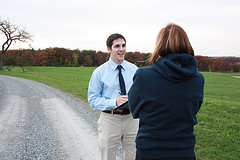
Operating like a small private law firm under the direction of professors Ross Pifer and Jeff Erickson, students in the Rural Economic Development Clinic work with various individuals and organizations — typically from the agricultural, food and energy sectors — providing legal research, document preparation and advice on legal issues such as landowner liability, and rights and responsibilities under contracts.
With the recent boom in Marcellus Shale natural gas drilling, it’s no surprise to learn that students int he Rural Economic and Development Clinic at Penn State Law have been engaged in reviewing oil and gas leases for landowners in rural Pennsylvania. Working with Penn State Cooperative Extension, which facilitated one project, the Clinic traveled to Clarion County and spent the day reviewing and explaining leases presented by landowners who were contemplating entering into the agreements.
“We received the leases ahead of time. Working under our supervision, students researched and reviewed potential issues before meeting with the clients,” said Pifer, director of the Clinic. “A real benefit for the students was having face-to-face time with the clients to answer their questions so that the landowners could make an informed decision about whether or not to sign the lease.”
“As ‘senior partners,’ professors Pifer and Erickson assign the cases, but the students contact the clients, set up meetings, and devise a plan of work. Most cases involve transactional legal work,” said Andy Schwabenbauer, of the law school’s class of 2011. “I reviewed oil and gas leases for landowners in Pennsylvania, created contract templates for Community Supported Agriculture (CSA) programs, drafted a comment on behalf of a trade organization in opposition of a proposed rule change, created the terms and conditions for a nonprofit business incubator, and revised a local stable’s horse lease. It’s a great opportunity to learn while doing.”
Recent graduate Christine Arena Nugent, also of the class of 2011, credits her work at the clinic with helping her hone her research and writing skills in a practical and meaningful way. “The Rural Economic Development Clinic allowed me to engage with our clients, improve my research and writing, and experience an exciting and growing area of law. From round table discussions to barnyard chats, I was able to interact with our clients regularly. My work required that I listen to the needs of the client and develop a strategy to fit those needs. The projects I completed at the Clinic truly impacted the lives of our clients, whether it was a lease we drafted or a legal guide for their farming endeavors,” said Nugent, of Israel, Israel & Purdy LLP in Great Neck, N.Y.
Team Approach
“Each matter is assigned to a team of two students which helps them build the interpersonal skills they will need in a firm. We use the team approach because it allows students to discuss and bounce ideas off each other in thinking through a case. In the end, the final product is a collaborative effort that draws on the strengths of each individual student,” said Erickson.
One of the advantages for students working in Rural Economic Development Clinic is that they are exposed to a range of different types of clients — from individuals to small businesses to organizations. “Working with different types of entities is a valuable experience for the student attorneys because they likely will be representing different types of clients in their practices upon graduation. The approach to representing an individual versus representing an organization can be vastly different,” said Pifer.
Work with the Northeast Equipment Dealers Association (NEDA) provided students with a two-part project. What started out to be a research and advice project evolved into something more extensive. NEDA initially asked the Clinic to advise them on the potential liability for members selling or servicing heavy equipment that lacked certain safety devices. After the students finished the research and realized that there could be liability, they developed some waivers of liability for the association who in turn would supply it to their members.
Field Director Tim Wentz said this of the Clinic’s work with the Northeast Equipment Dealers Association. “The student interns assigned to our team were genuinely interested in helping our dealers, and their quality of work and dedication was outstanding. They took it upon themselves to fully explore our problem, research the law, and identify multiple solutions,” said Wentz. “I was especially pleased with their ability to present all the options so that ‘we’ could fully and fairly evaluate the pros and cons, take our feedback and generate a resolution. It was obvious your team was committed to providing our member dealers with real-world answers as opposed to one you might find in a textbook.”
Another project involved the Pennsylvania Association for Sustainable Agriculture (PASA), which is working to connect people who have land and want to lease it with people who are looking to lease land in eastern Pennsylvania. “We had the students look at land leasing from a general perspective and identify legal issues that are present both from the lessor and the lessee’s perspectives,” said Pifer.
“As a follow-up to this work, the Clinic has represented landowners as well as farmers in the leasing process. Seeing a transaction from different viewpoints has helped the student attorneys to recognize the differing interests of each of these parties,” said Pifer.
A Win-Win Situation
“Our work at the Clinic is a prime example of Penn State’s long history of serving the people of Pennsylvania both through educating its students in the classroom as well as providing outreach,” said Erickson. “Students gain confidence, valuable insight, and hands-on skills training while providing a service to Pennsylvania’s rural communities. For the clients, the idea that they are contributing to the educational process of future lawyers gives them a special sense of satisfaction. It’s really a win-win situation.”
Ellen Foreman, Penn State University